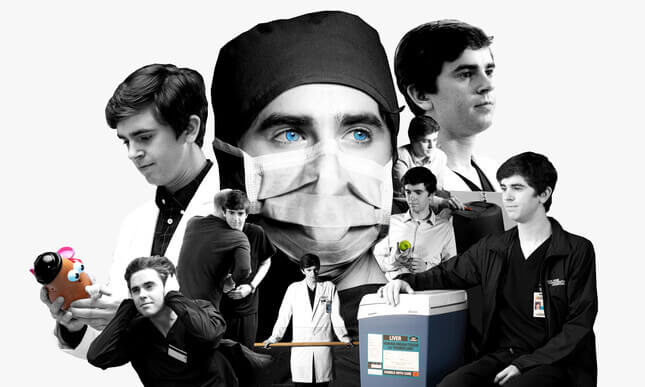Why The Good Doctor Matters


The Good Doctor—the ABC drama about a young surgical resident named Shaun Murphy (Freddie Highmore) who has autism and savant syndrome—has been a huge hit. It’s averaging 17.4 million viewers, surpassing even NBC’s This Is Us in the ratings, and Monday, Highmore was nominated for a Golden Globe.
The show follows Murphy’s life as he tries to navigate through his first year as a surgical resident at San Jose St. Bonaventure Hospital while dealing with colleagues and patients who sometimes don’t understand his challenges.
The Good Doctor’s success has been widely viewed as a surprise. But it shouldn’t have been. As someone with a brother who has autism, I could have told you that The Good Doctor would resonate with audiences across the country. It highlights a disorder that, according to the CDC, affects one in 68 children, and we rarely see people who have autism spectrum disorder (ASD) represented in pop culture.
There has been a wave of increased diversity in television when it comes to people of color and women. That’s really important. But the success of The Good Doctor is reminding us that seeing people with neurological disorders on our screens matters too. For some, Dr. Murphy’s character may be their first exposure to someone with autism; for others like me, who have been around someone with autism their entire life, the show is about finally seeing my experience reflected on a bigger scale. And The Good Doctor is effective not only because the main character has a successful career while still having autism, but also because, through each episode, viewers are able to understand a little more about what autism is, how Dr. Murphy’s brain works, and how his actions affect those around him.
From the moment I first watched the trailer for The Good Doctor, I knew it would speak to me. Having a younger brother with autism has lead me to constantly seek out representation of what I have seen in my own life. Of course, there have been other portrayals of people on the spectrum—Rain Man, most famously, and other recent shows like Atypical—but they didn’t catch my attention like The Good Doctor did.Just 10 minutes into the premiere episode, I could already relate to Dr. Murphy’s character. He was having flashbacks about being bullied by other children and his younger brother eventually came to help him. I often had to help my brother when he was being bullied. After making this connection, I was prompted to try and figure out each characteristic and experience that Dr. Murphy shared with my brother. Although my brother is not a savant or as high-functioning as Dr. Murphy, there were still many overarching similarities between them.
For example, Dr. Murphy has a certain routine that he follows every day and if that routine is disrupted—like when someone eats the green apple he usually has every morning—it throws his whole day off. If there is going to be a change in my brother’s routine, my parents and I try to prepare him ahead of time so that he can be at ease. When my brother was younger, we used to have to prepare him days in advance and keep reminding him; now we can tell him closer to the time of the change and he will be fine.
Dr. Murphy also doesn’t like loud noises. People with autism hear a lot of sounds at one time, which is another reason why it might take them a long time to respond to you. My brother used to cover both his ears with the palms of his hands, but now he sometimes just points to one ear and says it’s too loud.
Dr. Murphy has problems advocating for himself and gets continually overlooked because his superiors doubt his abilities. My brother also has problems advocating for himself; many times, people say he can’t do something and I am usually the one who has to tell them that he is perfectly capable. Watching The Good Doctor gives me hope that one day he will be able to be more independent.
At one point in the show, Dr. Murphy became so frustrated, he yelled and even hit a colleague. Tantrums were a common occurrence in my house when my brother was younger. He used to hit people all the time and would even scratch himself when he was frustrated. As he grew up, my brother stopped hitting, but now he sometimes still yells at people in his deep voice and will get in your face when he’s frustrated or angry.
Overall, Highmore’s portrayal of Dr. Murphy feels deeply accurate to me. His mannerisms, the way he speaks, and even how he rarely makes eye contact when talking to people are all characteristics of someone with autism. People who have autism have also said that the show accurately depicts someone on the spectrum.
It is of course important to point out that this is only one portrayal, that people with autism can range from being mute to having genius-level IQs, and that it’s not like The Good Doctor will solve all of our problems when it comes to representation of people with autism. But it is at least starting the conversation. Having representation in the media can help to eliminate the stigma about people with autism and open up new opportunities for them as well. There have been countless times when I tell someone my brother has autism and they reply, “I’ve heard of that before, but I don’t know what it is.” Now, they might ask, “Oh, like the doctor from that show?” and we could actually start talking.